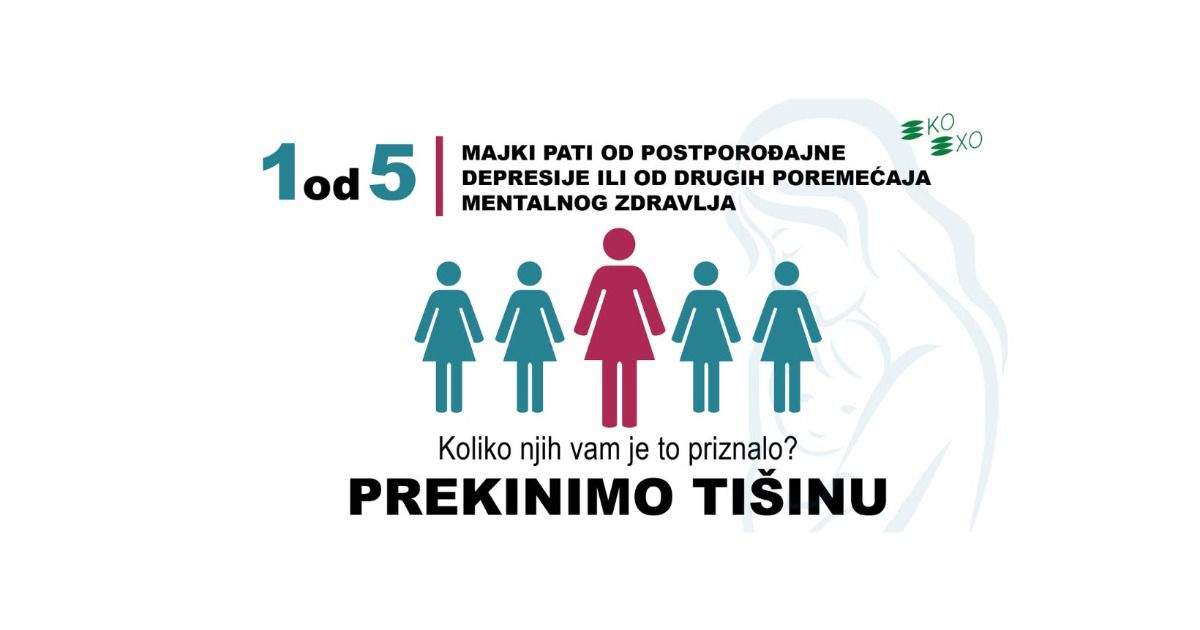
“Pregnancy was one of the most beautiful periods of my life. I truly enjoyed every moment of it. However, very soon after giving birth, I felt unable to connect with my baby. I didn’t feel what I had imagined I would. It was nothing like the emotion I had during pregnancy. I constantly felt sadness and guilt. It took me a long time to overcome this state, and now I regret that I went through it alone and didn’t have the courage to reach out to anyone. Memories of this period might have been different.”
“At the beginning of all these emotions, I felt the need to talk about it anywhere, regardless of who I was talking to. But the lack of understanding from others eventually replaced my need to talk with even greater sadness, which in turn led to feelings of anger and resentment toward everything – except my child.”
Have you ever heard women around you share similar or even worse experiences after giving birth? Did you know that, according to data, 20% of women experience some form of postpartum depression? This means that if you know five mothers, you know one who has experienced postpartum depression or another mood change during pregnancy and/or after childbirth. These are experiences that many women go through in the postpartum period, but such experiences often remain unspoken, leaving new mothers to suffer in silence, which deepens the depression.
Many mothers in the postpartum period feel isolated and excluded from the adult world, even when surrounded by family and friends. They often feel they have “lost” themselves as their identity is reduced solely to the role of a parent. Conversations with others revolve around baby care, while they themselves may feel invisible. Additionally, society often expects motherhood to be fulfilling and joyful, but the reality is that it can be exhausting and lonely. If those around them don’t understand the challenges mothers face, it can lead to feelings of alienation. If partners or close people minimize their emotions (“Enjoy it while it lasts,” “It will pass,” “We all went through it”), mothers may feel even more excluded. That’s why community support from other mothers can be crucial.
According to the World Health Organization, depression is currently the second most common illness globally, and postpartum depression, as one of its forms, not only affects the mother’s mental health but also the psychological, cognitive, neurological, and motor development of the child. The consequences are enormous, both for women and for society as a whole. Suicide, as the most extreme consequence of postpartum depression, is the leading cause of maternal mortality worldwide, and Bosnia and Herzegovina is no exception when it comes to these tragic cases.
Although awareness of these issues has increased compared to earlier times, there is still much room for improvement and positive change. It may be challenging to change deeply rooted misconceptions and the stigma surrounding mothers’ mental health, but systemic support can enable change. One systemic solution for postpartum depression is the introduction of early screening, advocated by the organization EKO EHO from Banja Luka. They emphasize the importance of regular systematic screening, highlighting that this approach allows for early problem detection, timely intervention, and significantly improves the quality of life for families. Implementing mandatory systematic screening for postpartum depression greatly contributes to early detection and timely assistance, thereby improving family life quality and reducing the burden on the healthcare system.
Early screening for postpartum depression was previously implemented in the Republic of Srpska using the Edinburgh Postnatal Depression Scale – a globally recognized method that is reliable, quick, and low-cost. However, this practice was discontinued at the beginning of 2024.
“So far, we have submitted an initiative for mandatory screening to the Ministry of Health and Social Protection of the Republic of Srpska. The documentation regulating the screening process is currently being drafted, and we expect its revision and finalization soon. We also had a very successful meeting with the Assistant Minister for Public Health at the Federal Ministry of Health, Dr. Goran Čerkez, who expressed willingness to introduce screening for postpartum depression in healthcare institutions in the Federation of Bosnia and Herzegovina. Additionally, we are awaiting a response and a meeting date from the Government of the Brčko District of BiH and the Public Health Center in Brčko. We are preparing an initiative for mandatory postpartum depression screening, which we will soon submit,” said Jelena Mihić Salapura from EKO EHO – Center for Education and Promotion of Healthy Living.
The first steps towards introducing early screening in the Federation of BiH, the Republic of Srpska, and the Brčko District have been made. With institutional support, early screening for postpartum depression could become a reality in 2025. A safer environment for mothers, along with greater support, understanding, and care from family, friends, and society for the mental health of new mothers, should also become a reality.




